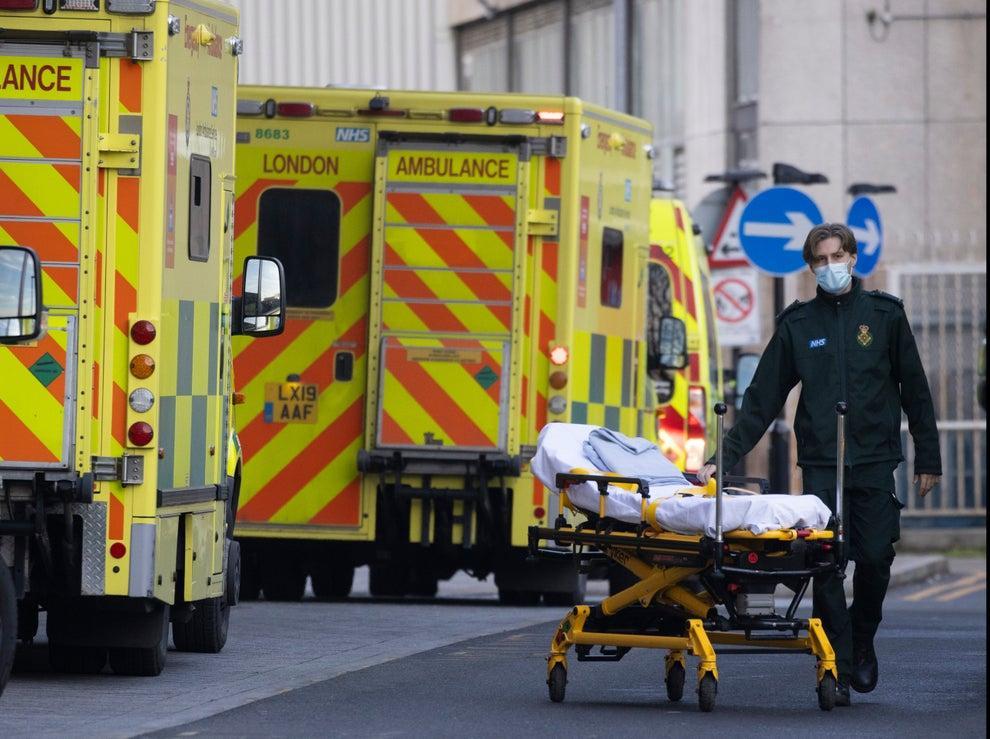‘Borderline meltdown’: NHS emergency services brace for soaring demand this weekend
NHS England quietly scrapped its Covid assessment service at the end of May as infections began rising

NHS emergency services are bracing for a flood of call-outs this weekend as England prepares to take on Italy in the Euro 2020 final in the middle of a summer crisis for hospitals.
The Independent has learned that patients have been forced to queue for up to an hour outside one A&E department, with some waiting up to 20 hours for a bed earlier this week.
In Scotland, call volumes to the NHS 24 telephone helpline are up to 60 per cent higher than a year ago, with waiting times of up to 90 minutes to get through.
Meanwhile, rising pressure on England’s NHS 111 system has been blamed on a decision by NHS England to scrap a dedicated Covid telephone assessment service as cases began rising across England.
The South East Coast Ambulance Service has declared a “black alert” this week along with four other ambulance services in England, and is preparing for an increase in calls this weekend to coincide with the Euros final at Wembley.
After England’s semi-final win, the service saw a 50 per cent spike in ambulance call-outs in the hour after the match, compared to the hour before.
The trust said it was urging the public to help ahead of Sunday night’s final against Italy. As in other parts of the country, the service has been facing high demand for a number of weeks and is typically handling 3,000 calls a day, compared to a usual average of around 2,500.
One member of staff told The Independent on Friday that the service “was in borderline meltdown”. Staff morale was suffering, they added, as crews were forced to take breaks miles from their home base and expected to work beyond the end of their shift due to delays at hospitals.
A spokesperson for the South East Coast Ambulance Service said: “We appreciate the pressure our staff are under and we take their welfare seriously.
“We are working hard to respond to patients as quickly as possible while prioritising our response to those who are most seriously ill or injured – the best way to seek urgent care is by first calling 111, or using 111 online, for an assessment that will refer patients to the most appropriate service available.”
In the past few days, The Independent has reported on concerns over unsustainable demand for A&E and ambulance services, as the government presses ahead with ending all coronavirus restrictions on 19 July.
At Addenbrooke's Hospital in Cambridge on Thursday, patients were queueing outside the door of the A&E department for over an hour just to be booked in to be seen. Staff in the department revealed that some patients had waited 20 hours for a hospital bed.
Also on Thursday, The Independent reported waits of 15 hours at Plymouth’s Derriford Hospital.
And as infections across the country continue to rise, The Independent has learned that NHS England has decommissioned its Covid Clinical Assessment Service (CCAS), which was set up at the start of the pandemic to take pressure off NHS 111.
CCAS employed retired GPs and other clinicians to field 500,000 calls from patients during the pandemic. But the scheme was quietly stood down, with contracts coming to an end on 30 June, although calls made to the service were diverted back to NHS 111 from 23 May.
One former worker employed by CCAS said: “The service offered home management, onward referral to local services, and could call ambulances for patients without going through 999. I can’t help but wonder whether [the closure of CCAS] has anything to do with the rise in demand for unscheduled care in June.”
They added: “It seems crazy to stop now – people will still get Covid even if vaccinated, and will need to access services.”
Meanwhile in Scotland, calls to its telephone helpline have soared as hospitals across the country have declared black alerts.
Staff working in NHS 24 call centres said some patients were facing 90-minute waits to get through, with ambulances taking 11 to 12 hours to reach some patients due to the sheer volume of demand.
A spokesperson for NHS 24 confirmed that current demand was between 50 and 60 per cent higher than in 2020, and average wait times were 16 minutes.
They said: “As with the whole of the NHS across Scotland, demand for NHS 24 services has increased as a result of the Covid-19 pandemic.
“There may be times when callers have to wait longer than we would like for their call to be answered. Patients calling with Covid-19 symptoms currently account for approximately 24-30 per cent of calls to 111, and we have seen an increase in recent weeks.”
Since January, the service has recruited an extra 192 staff to help cope with demand.
An NHS England spokesperson said: “The NHS in England remains at a level three incident, the second highest state of alert, with staff working hard to manage demand as patients come forward for treatment.
“NHS capacity is flexed according to patient need, and while 111 calls relating to Covid have reduced significantly from when CCAS was first introduced, additional 111 capacity can be stood up quickly if required.
“All NHS 111 call handlers are able to advise patients on the best way to proceed if they have symptoms of Covid, so if you need urgent care, go to NHS 111 Online or call 111 so that the best option for you can be determined.”
Subscribe to Independent Premium to bookmark this article
Want to bookmark your favourite articles and stories to read or reference later? Start your Independent Premium subscription today.

Join our commenting forum
Join thought-provoking conversations, follow other Independent readers and see their replies